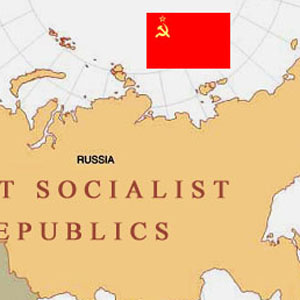The Impact of Socialist Revolution on Iran-RussiaTies
The socialist revolution changed the relations between Iran, Russia and Britain

The First World War hadn’t ended yet when the Socialist Revolutiontook place in Russia. In a message to the Muslims of Russia and East, Leninclaimed that secret treaties on dividingIranhave been abrogated and the Russian troopswill draw out ofIran.
At the same time, Hossein Qoli Navvab, Iran’s plenipotentiaryambassador in Germany, reported the end of war between Germany and the OttomanEmpire and Russia’s promise to withdraw its troops from Iran’s territory toMinistry of Foreign Affairs.
Through a letter the newly established Bolshevik regime of Russiainformed the Iranian government that any treaty previously imposed on Iran thatviolates Iran’s freedom and independence will be deemed as invalid. Toconsummate this aim, Karl Bravin, the first political envoy of the socialistregime enteredIranand through an announcementasserted that all unjust treaties will be abrogated and fair treaties willreplace them.
Negotiations with the newly found Soviet Union continued inTehranandMoscowand were finalized during the primeministry of Moshir-o-doleh. Moshaver-ol-molkAnsari, Iran’s ambassador toIstanbulwas assigned to the new mission and sent toMoscow. Finallya treaty was drawn up betweenIranand the now-called Soviet Union and sent toIranfor approval.
The pact was ultimately signed on 27thof February, 1921and affirmed by the Fourth Parliament on 14thof December, 192. Thepact consisted of 26 articles, prepared through the attempts ofMoshaver-ol-molk, now Iran’s ambassador to Russia.
According to this treaty, the personal and real properties ofRussia’s Loan Bank were ceded to Iran and all the concessions given to theTsarist Russia and its subjects were revoked.
The Bolshevik regime also cededIranthe Anzali-Tehran and Qazvin-Tehran roadway, with all their appurtenances. Thequay and transportation vehicles in Urumiye roadway, and all the telegraph lineswere relinquished toIran. According to 1921 agreement, Soviet Unionrenounced all its claims andannulled capitulation.
Meanwhile, Soviet Union kept for itself the right to send its troopsintoIran, in case of a thirdcountry’s military interference inIranand its threat toRussia’sborders.
The Soviet regime also ended up the possession of Zargandeh villageand ceded it toIran. In return, Iranian governmentrelinquishedAtabakParktoRussiato settle its embassy there. Iran-Russia affairs also moved back to embassy level.
The 9thof August, 1919 agreement
Britainrealizedits long-time opponent exitingIran’s political scene with the socialistrevolution accomplished and the new regime revoking its pacts withIran. Londonstarted negotiation withIran’s Prime Minister, Vosuq-o-duleh, to sign atreaty in order to implement counselor system inIran. TwoMinisters, Akbar Mirza Sarem-o-duleh (Minister of Treasury) and Firuz MirzaNosrat-o-duleh (Minister of Justice) accompanied Vosuq-o-duleh in thesenegotiations. Other Ministers were not informed at all, even Moshaver-ol-molk, the Foreign Minister who should naturally participate in the negotiations.
After primary negotiations, the British government sent twodiplomatic delegations toIran. One, the fiscal advisors headedby Armitage Smith, and the other a military group consisted of 7 people, headedby General Dickson. Representatives were appointed by the Iranian government tonegotiate with these two delegations. Britainwas supposed to grant a 2 million poundloan toIranfor implementing its plans. Uniform troops were supposed to be formed (with at least 70,000 recruits) andfiscal affairs were to be under the full control of the British.
In August of 1919, Vosuq-o-duleh signed the agreement and broke thenews, at the same time with Ahmad Shah’s travel toEurope. Britaingave a 130,000 pay-off toVosuq-o-duleh, Sarem-o-duleh and Nosrat-o-duleh, Vosuq-o-duleh taking 65,000pounds and Nosrat-o-duleh and Sarem-o-duleh taking the remainder. On AhmadShah’s travel to Europe, the cabinet was shuffled and Nosrat-o-duleh, theMinister of Justice was appointed as Minister of Foreign Affairs, so that hecould officially pursue the negotiations inEurope.
With all the efforts of Vosuq-o-duleh inIranand Nosrat-o-duleh inBritainthe agreement didn’t become practical, so the British government devised anotherplot, the 21stof February 1921 coup, proposed by generals. Consequently, uniform troops were formed. Iran’sfinancial affairs came under full foreign control, headed by Dr. Arthur Milespofor 5 years.
Vosuq-o-duleh fled toEuropeafterthe abrogation of 1919 treaty and resided there for 5 years. In 1925 he returnedtoIranand the 65,000 pounds was takenaway from him. He was the Minister of Treasury and Minister of Justice in HasanMostufi’s Cabinet for some time in 1927 and afterwards a member of theparliament. His last position was as the head of Academy during Reza Shah’sreign.

